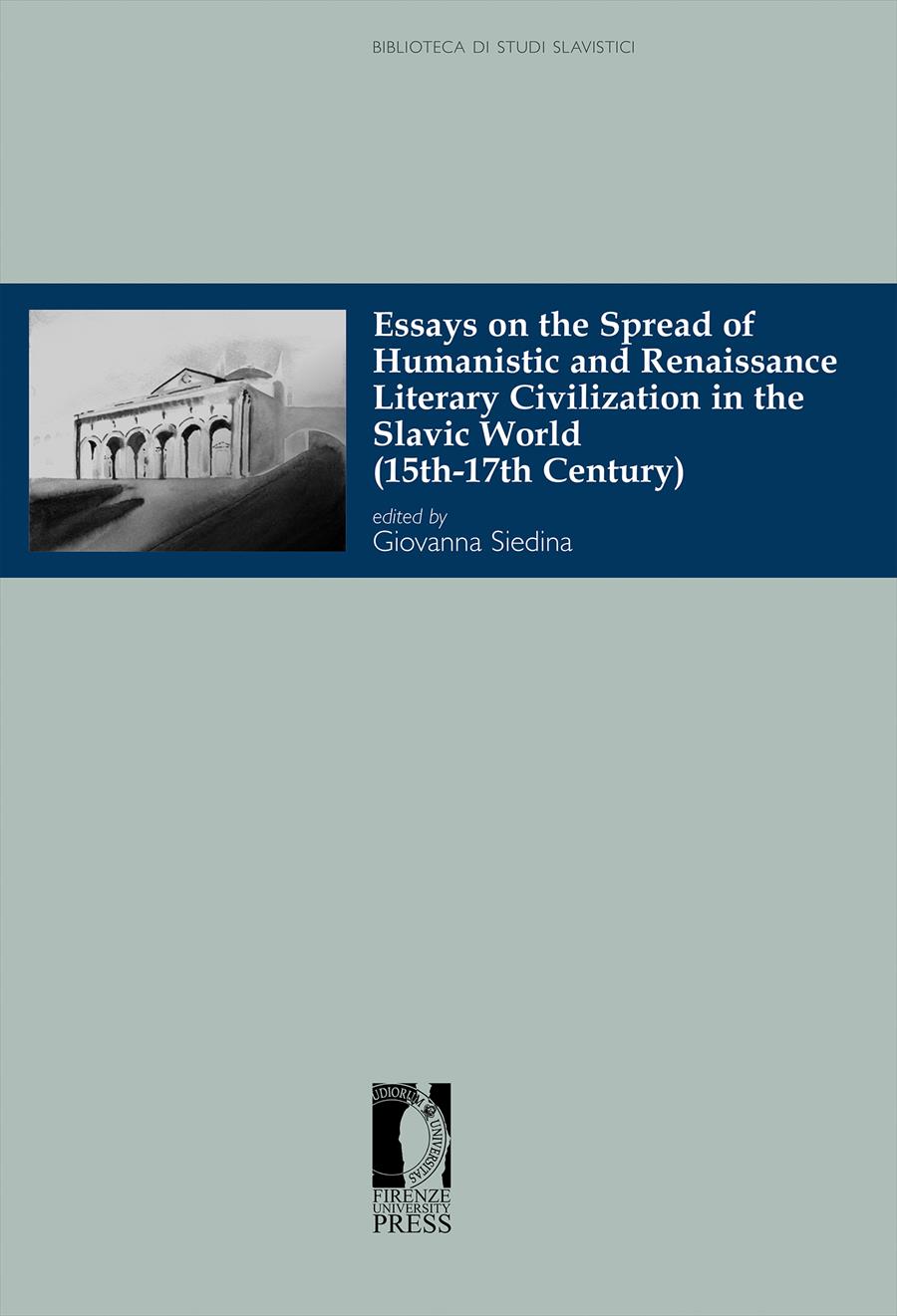Essays on the Spread of Humanistic and Renaissance Literary Civilization in the Slavic World (15th-17th Century). An Introduction
- Giovanna Siedina
- © 2020 Author(s) |
- CC BY 4.0
- DOI: 10.36253/978-88-5518-198-3.01
In this article the author, after briefly summarizing different interpretations of the Renaissance, shortly outlines some modes that have characterized the reception and study of Humanism and the Renaissance in Slavic countries. She then illustrates the content of the essays gathered in two recent histories of Ukrainian literature , with a special focus on the novelty of their interpretative approach. The author argues the importance of abandoning the old national-driven interpretation, in favor of the adoption of an areal and supranational point of view which allows the analysis of related cultural phenomena in a wider perspective.
- Keywords:
- Humanism,
- the Renaissance,
- Slavic cultures and literatures,
University of Florence, Italy - ORCID: 0000-0002-3336-552X
- Alberti, Ivan Aleksandăr (1331-1371): Splendore e tramonto del secondo impero bulgaro, Firenze 2010.
- J. Burckhardt, Die Kultur der Renaissance in Italien, 1860 (traduzione italiana La civiltà del Rinascimento in Italia, Firenze, Sansoni, 1990)
- E. Garin, Medioevo e Rinascimento, Bari 1987.
- I.N. Goleniščev-Kutuzov, Ital’janskoe Vozroždenie i slavjanskie literatury XV-XVI vekov, Moskva 1963 [trad. it. Il Rinascimento italiano e le letterature slave dei secoli XV e XVI, voll. 1-2, a cura di Sante Graciotti e Jitka Křesálková, Milano 1973]
- I.N. Goleniščev-Kutuzov, Gumanizm u vostočnych slavjan (Ukraina i Belorussija), (V Meždunarodnyj s”ezd slavistov), Moskva 1963.
- I.N. Goleniščev-Kutuzov, Predrenessansnye processy v kulture južnych Slavjan do tureckogo zavoevanija i vizantijskaja tradicija, in: Slavjanskie literatury. Stat’i i issledovanija, Moskva 1973, pp. 17-37.
- S. Graciotti, Il Rinascimento nei paesi slavi. Per una definizione dei termini e dei concetti, in: Contributi italiani al X Congresso Internazionale degli slavisti, 1988 (= “Europa Orientalis”, VII), pp. 215-258.
- S. Graciotti, E. Sgambati (a cura di), Rinascimento letterario italiano e mondo slavo. Rassegna degli studi dell’ultimo dopoguerra, Roma 1986.
- N.I. Konrad, Ob èpoche Vozroždenija, in: Zapad i Vostok: Stat’i, Moskva 1966, pp. 240-281.
- D.S. Lichačev, Nekotorye zadači izučenija vtorogo južno slavjanskogo vlijanija v Rossii (IV Meždunarodnyj s”ezd slavistov. Doklady), Moskva 1958.
- D.S. Lichačev, Izbrannye trudy po russkoj i mirovoj kul’ture, Sankt Peterburg 2015.
- R. Picchio, ‘Prerinascimento esteruropeo’ e ‘rinascita slava ortodossa’ (A proposito di una tesi di D.S. Lichačëv), “Ricerche Slavistiche”, VI, 1958, pp. 185-199.
Informazioni sul capitolo
Titolo del capitolo
Essays on the Spread of Humanistic and Renaissance Literary Civilization in the Slavic World (15th-17th Century). An Introduction
Autori
Giovanna Siedina
Lingua
English
DOI
10.36253/978-88-5518-198-3.01
Opera sottoposta a peer review
Anno di pubblicazione
2020
Copyright
© 2020 Author(s)
Licenza d'uso
Licenza dei metadati
Informazioni bibliografiche
Titolo del libro
Essays on the Spread of Humanistic and Renaissance Literary Civilization in the Slavic World (15th-17th Century)
Curatori
Giovanna Siedina
Opera sottoposta a peer review
Anno di pubblicazione
2020
Copyright
© 2020 Author(s)
Licenza d'uso
Licenza dei metadati
Editore
Firenze University Press
DOI
10.36253/978-88-5518-198-3
eISBN (pdf)
978-88-5518-198-3
eISBN (epub)
978-88-5518-199-0
Collana
Biblioteca di Studi Slavistici
ISSN della collana
2612-7687
e-ISSN della collana
2612-7679
